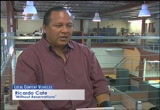tv Book TV CSPAN February 2, 2013 8:00am-9:00am EST
8:00 am
>> welcome to c-span2's booktv. every weekend we bring you 48 hours of books on history, biographies and public affairs by nonfiction authors. .. many years ago louis bran dice wrote that the most important office in a democracy is the office of citizen. democracy, of course, is rooted and based in the notion of an enlightened citizenry. some of us think that some of us think democracy is
8:01 am
defined by the ritual of voting. in voting voting is important in a democracy but voting takes place all over the world, takes place in democracies, takes place in dictatorships, takes place in totalitarian societies. voting alone does not mean that we live in a free society. we live in a free society when it is based on an enlightened citizenry that takes that enlightenment into action, causing those whom we would elect to honor our ideals as a nation. >> dr. activist and transafrica founder randall robinson taking your calls, e-mails, facebook comments and tweets, in depth,
8:02 am
this sunday at noon eastern on booktv on c-span2. >> my cartoons depict native humor. at first when i first started this cartoon they were native characters in native situations and my audience was geared towards natives but in the last four or five years they have become more universal where they spilled out into the main theme or dominant culture so it is more universal now. i am inspired by the people that i grew up with, my friends, my family, members of my tribe and basically watching people and the things they do. it is surprising if you pay
8:03 am
attention to what people do and what people say there's a lot of humor you can find in that, making your own choices and certain things. people who have read my cartoons for the first time take with them an appreciation of the native culture and the native way of life. because it is not always depicted correctly in cinema or books. this cartoon is coming from a genuine native american and these are my people and even though they may not agree with some of the cartoons i hope they can appreciate it because it is coming from a real person that has grown up on a reservation and has seen the dominant culture and lived with the dominant culture and some of this stuff i learned from that i put back in my cartoons. >> cartoonist ricardo cate, one
8:04 am
of the authors you will meet when local content of vehicles with behind-the-scenes of the history of literary life at noon eastern of c-span2's booktv and sunday at 5:00 on american history tv on c-span3. >> wenonah hauter, organic farm owner and executive director of food and water watch argues that agribusiness like conagra, conagra and if -- tyson have hurt farmers and limited consumer choices. he speaks for about an hour next on booktv. [applause] >> thanks for coming this evening. i am excited to be here. i am kicking off a book tour for "foodopoly" this week. i have been thinking about writing a book for a long time.
8:05 am
"foodopoly" is really what making people so sick and unhealthy in our society and in my day job as food and water watch we ran into the call of companies that are really dictating food and farm policy in this country. when you ask most people why so many children drink twice as many sodas as they did in 1970 or why 35% of adults are obese and 17% of children, most people say it is -- it is the subsidies. people don't really know what is causing the problems with our food system. what really set me off to write "foodopoly" were a couple of events that happened in a weekend in 2011. i was traveling to a conference in the midwest as part of my jaw
8:06 am
that food and water watch and stopped to use an article i was writing and over the course of my work get food and water watch i talked to a lot of farmers but my questions were about how well they were doing. we look at the census of agriculture statistics and we know from those statistics that farmers are not doing so well. one farmer in particular was telling me a heartbreaking story. he was thinking of selling his farm, i used to be an independent livestock growers because states like iowa, missouri, people would buy farms where they raised vegetables and had some livestock and grew their own feed. that is simply not possible anymore. he doesn't have enough land to make money from commodities so he is going to sell his farm that has been in his family for
8:07 am
200 years. was a very sad story. the next day i was at a conference, food conference and listening to a panel on commodities and they would ask well known and very well intentioned food advocates, this person was asked during the question period why is organic food so expensive? why are people growing so many commodities instead of organic food? this person answered with a straight face it is because farmers get huge subsidies and because of the subsidies they don't grow organic -- went on to basically call farmers greet the welfare queens. not using that language but that was the image. i felt really saddened and upset about this because a better answer would have been because we don't have a fair market for
8:08 am
farmers to sell into and midwestern farmers really don't have the equipment to grow vegetables or to compete with california or all the places in the developed world where fruits and vegetables are coming from. i went home that weekend and started riding the outline for "foodopoly". let's start by talking about subsidies. this is not a very popular issue and people often their eyes glaze over but it is of very important issue. i am not here to justify the subsidy system. obviously it is bad public policy but blaming all the ills on the food system on the 17-year-old subsystem is distracting from the meaningful issues. the subsidy system is a symptom of what is wrong with our food system. it is a band-aid that covers the bad agriculture policies that
8:09 am
benefit the biggest food companies in the country and in the world and we need to reform the food system and the marketplace before we get rid of subsidies and if we get rid of subsidies we are going to lose a very high percentage of small and mid-size farms and we really need farmers to fix the food system. we don't want to demonize farmers. they are victims of the system as well. i am going to ask you to stick with me while i go through some farm history and statistics that are really important if you want to understand how the food system that is making us sick really operates. we know that experts from all sides of the political spectrum often point to subsidies and getting rid of subsidies, a silver bullet.
8:10 am
you often hear it is the single most important thing we could change. you will often hear that only the largest farms get subsidies, small farms get nothing. remember that saying mark twain really popularized, lies, damn lies and statistics. is really true when you are looking at farm numbers and statistics. that is the case with the u.s. department of agriculture statistics. the problem with this analysis on subsidies is the statistics that are used by usda assert that we have 2.2 million farmers. the agency is probably very embarrassed about the lousy job they have been doing because they are lying with those statistics. a close look at the numbers shows that usda numbers count the one third of two.2 million
8:11 am
entities that have failed under $1,000 and two thirds of those entities have failed under $10,000. those are not profits, those are sales. those are the small businesses down the road from my family farm. i don't run, my husband runs. i have a neighbor who may sell $10,000 of grapes a year to a winemaker down the road. i am not sure if he sells that many and i have a friend who has come close and has a flower business during the summer. i know she makes under $1,000 in the summer growing flowers for a local restaurant. she does it because she enjoys it. these are not farmers, these are not people who consider themselves farmers, they are often retirees and are counted
8:12 am
as farmers when we are looking at these subsidies because why would we subsidize small hobby farmers? it is true that the largest farms receive the largest share of farm subsidies and some politicians and urban residents really benefit unfairly from subsidies but we can't let this critique overshadow the fact that small and mid-size farms are suffering on government programs as a critical safety net. we don't want to allow the baby and the bathwater with the bathwater as my mother used to say. after accounting for all the costs of farming, small and medium farms nash just over $19,000 a year. that is from the usda's most recent statistics. the government programs make up nearly half of that amount and
8:13 am
learning from all farm jobs make up the rest of the household's in come. the income of full-time farmers is 19% below u.s. average. farm income is in keeping up with the cost of producing crops even though the price of corn and soy is higher since 2007. the ever inflating cost of seed is a really good example. i am sure you will know chemical and pharmaceutical giants now dominate the feed industry, companies like monsanto and the prices have skyrocketed. corn seed prices rose 34% since the fiscal crisis and soybean seeds are up 24%. also the cost of fuel, fertilizer, seed and other imports climbing pretty expensive venture not to mention the bad weather and drought,
8:14 am
making it really a roller-coaster ride, and small and mid-size farms operate at a really slim margin. if the program is eliminated, without creating a fair market, farmers can sell into, we are going to lose a lot more farms. a family-run operation that will really be critical for transitioning into a sustainable food system. what happens when these farmers go bankrupt? and we have thousands and thousands of them in the last few decades that have gone bankrupt. in the u.s. out of the fewer than 1 million farmers there are 150,000 very large farms. these are corporate farms you hear about, many of these are contract labor, certainly far as where the farmer is doing all the work. so you might ask how did we end
8:15 am
up with a subsidy system and who really benefits from it and who is lobbying for it? now we are going to look at some farm history, some of which you already know. starting in the new deal the government created programs to deal with overproduction and create prosperity for farmers. family farmers really suffering in those days and from overproduction. overproducing crops have always been the bane of farmers because what it does is drive prices down and the companies that buy those crops for ingredients really like those prices to be driven down. the new deal programs for supply management programs, the problem is individual farmers always want to plant as much as they possibly can so that they can make as much money from
8:16 am
equipment and land. today the cost of production, so if every farmer is growing everything that they can that means we will have a lot more commodity crops than we really need so in the 1930s to prevent this overproduction the roosevelt administration created this program to reduce the amount of acreage and this program lasted a long time and it is a good idea to take marginal land, the least productive, the most ecologically sensitive land out of production and created other supply management programs to limit overproduction. these were things like the grain reserve. we have an oil reserve but don't have a green reserve anymore. there was a lot of controversy
8:17 am
about these programs because what happened this farmers started being able to make money from new crops based on the market. and so there were business interests even in the 30s and 40s that were opposed to this. in 1942, several businessmen and an advertising executive put together a business organization that has played in decades since a very powerful role in shaping the post world war ii economy and society. it was called the committee for economic development and it was a place where the leaders of business could hammer out their differencess on economic issues and use new techniques of public relations to promote their agenda and among the founders were the president of
8:18 am
studebaker, the inventor of modern research and polling and and eastman kodak executive. those were the titans of industry in the 1940s. it represented industry, banks, railroads, grain traders and other corporate interests and one of their agendas was i got this quote from their publications, quote, get those boys off the farm, end of quote. they wanted to create a really cheap labor pool for industry because in 1935 there were 6.8 million farmers and 64% of the population lived in rural areas. so immediately after its formation, they started mapping out a postwar program to expand chemical intensive agriculture and to grant industrial and financial interests, of more control over producing and
8:19 am
selling food. they had another agenda, she commodities and cheap labor. you have to realize that today we only have sixteen million or sixteen% of the population that lived in rural areas. these leaders of the c e d wanted to reduce the world population and when you go back and read the materials you can understand why because until the new deal, farmers had been on an economic roller-coaster ride and they were the backbone of the populist movement after the civil war. farmers were really dynamic political force and they were on the vanguard of organizing and protests against big business and the ced didn't relish all these soldiers coming back from world war ii, going back to the farm and having an educated
8:20 am
population that would have some political power. i am not suggesting this is a conspiracy by any means. this was simply people of social clubs, the circles they operated in, acting for their self-interest and for some of them, they thought this was the best thing for the country. these men represented disparate interests and for the most part they were technocrats. they viewed the world through this germans. some of them had grown up on farms and didn't if think much of the idea. their definition of reforming agriculture meant substituting capital for farm labour and replacing small farms with largely integrated ones that could supply the food company's
8:21 am
with the ingredients they needed. so the ced and the business interests they represented lobbied against the new deal farm programs and they began to really successfully start chipping away at them in the 1915s during the eisenhower administration. in 1962 the ced published a report prepared by 50 influential business meters and 18 economists from leading universities. it is called an adaptive program for agriculture and it laid out a plan to drastically reduce the number of farmers and create a large labor pool and it would be accomplished by getting these boys out of agriculture before they established a career there. it recommended things like stopping the promotion of agriculture and other vocational training, reeducating young men
8:22 am
through jobs and industry, providing economic help for young men to relocate in places where it these deals could be utilized and advocated removal of programs for overproduction that allow farmers to make a living on par with urban residents. and the usda had begun thinking that way as well. the usda report noted of the existing farms, 2.5 million didn't meet agency production criteria. it stated that 84% of farm products come from one third of u.s. forms and their goal was to, quote, the surplus manpower into productive non agricultural activities. in this 1962 report it also had
8:23 am
a vision for globalized food production system to free trade. they followed this report 1964 with a report called trade negotiations for a better free world economy and this made a lot of recommendations that actually came to pass when the world trade organization was established in the bilateral trade agreement. it was all about going to where production could be done. this isn't a conspiracy, this is just companies thinking about where and how they could be most profitable. so it took 30 years to completely eliminate the new deal programs i was talking about to manage overproduction. it was during the clinton administration after the u.s.
8:24 am
joint the wto that the very controversial 1996 farm bill passed. that is a legislation that completely did away with the remaining new deal protections and it deregulating what had already begun in the 1950s and stopped all government intervention in commodity markets and eliminated all the final -- of the programs like the grain reserve and the most immediate result after that bill passed, those of you who are old enough, it was called freedom farm:farmers quickly started calling it freedom to failed. the most immediate result of the legislation was the dramatic increase in the production of commodities. all of the programs that kept the marginal land out of production which is really good
8:25 am
for the environment were now being planted from fence row to fence row. by 1999 the price of corn was 50% above 1996 levels. fifty% below 1996 levels and full was down 41% and farmesoy was down 41% and farmers were in major economic distress. lobbying and policymakers didn't address these problems by reinstating supply management provisions. instead congress used taxpayer money to keep farmers afloat so they wouldn't be putting pressure in rural areas on members of congress. these emergency payments were instituted in 1998. the payments were made permanent
8:26 am
in the 2002 farm bill and that is how the subsidy system was born. who are the main beneficiaries of this subsidy system? really the food and the meat industry and grain traders who are the winners. the regulations saved them money by allowing them to pay farmers less for their crops than it cost to produce those crops. it is not the subsidies themselves that are the source of the savings. it is all of the money that they save from those low prices year after year and subsidies really quell the political problems for members of congress and the won't really do what they are supposed to do. so removing the federal policies that kept overproduction in check and commodity prices stable made grain prices plummet and it led to the profitability
8:27 am
of junk food and factory farm produce to meet. researchers estimate companies that saved a total of $1.7 billion, they estimate that the meat company saved $4 billion on animal feed between 1997-2005 and obviously it had the opposite effect on farmers. let's look at a few corn heavy products as an example. farmers receive $0.05 less from a sale of a box of cornflakes, $0.03 from the sale of a full bag size of corn chips and the corn content of a soda in the form of high for goes corn syrup gets farmers $0.02 out of the consumer dollar. $0.98 goes to the food companies that make, market and sell soda and you buy high fructose corn syrup, in all comes from triad
8:28 am
and has to be bought by the ton for food grade high fructose corn syrup. the commodity price constitutes a tiny share of the final retail price. let's think about how the typical american eats. 90% of the food budget goes to buying processed foods. 84% of americans feed their child at a fast-food restaurant once a week and there are hundreds of thousands of brands. they shop for beverages, they might buy pepsi, gatorade, lipton tea, root beer, energy drinks, bottled water, if there health-conscious they might buy naked juice. for breakfast they might buy
8:29 am
captain crunch breakfast cereal, and jemima, meals and snacks they might buy lay's potato chips, sun chips, cracker jacks, burritos or ruffles. what the consumer probably doesn't realize is all of those brands are owned by pepsi. pepsi is the largest food company in the united states if you want to call those items food and it is the second-largest in the world. they might buy a nasty product. and won't go through all the nasty --nestle brands. they had $10.5 billion in profit. patty had $6.4 billion in
8:30 am
profit. nestle is the biggest producer in the country. we have just a few companies that are controlling all of those brands. 20 companies controlled highest percentage of brands in the grocery store and of those, 14 of those brands control organic food. so big food is controlling what people see. then the grossly conglomerate, walmart leads the pack along with kroger, wal-mart is by far the largest, one of every three grocery dollars goes to walmart. they have more wealth than the bottom 3% of all americans. if we wonder why they have a lot of clout and political power.
8:31 am
these really big multinationals, political and economic power to basically dictate food and farm policy. they speak with one voice and decide what the pesticide regulation should be. what nutrition labeling is. every aspect of our food system and they partner with the biotech industry which has become so powerful that it can basically by public policy. and food water what we did a report on the biotech industry, turns out there are 100 biotech companies lobbying full-time and of those they have hired 13 former members of congress and 300 former staffers of the white house and congress so the biotechnology industry has a lot
8:32 am
of clout. walmart, really partnering up in some way. one of the ways was recently with genetically engineered sweet corn. you may remember this from last summer. food and water watch and a lot of other consumer groups were trying to get walmart because they say they want to be sustainable, to not buy this sweet corn but they did buy the sweet corn and when walmart buys something it creates a market and a plan to have a very quick 40% for the market for sweet corn genetically engineered variety and it won't be labeled. so those who say that wal-mart is going to rear regionalize the food system need to look at the lobbying record that wal-mart has. its model is basically putting
8:33 am
pressure on suppliers to cut costs and use every trick in the book to do that. i going to great detail in "foodopoly" about this. we don't have enough time to deal with it this evening but one of the things walmart has done effectively to reduce this cost is to buy most of its products, food or consumer goods, high percentage of products come from the developing world especially china and walmart and these food processors and grain traders were the biggest proponents of globalizing the food system. they find it advantageous to process, grow food where it is cheaper in countries where environmental laws are weaker and they have an easier time dictating policy and increasingly our foods are being
8:34 am
produced in these countries and if you are talking about organics it is very difficult to verify in the u.s. that organic products are meeting standards so we can imagine how this is happening in places like china. basically what we are advocating and the reason i wrote "foodopoly" is that we need to do more, it is great that the local foods movement is valuable. i have a farm, we love our farm, we love people coming out but we don't envision that our farm or the farmers' markets in the d.c. area will never be able to feed the entire population because you have to be able to focus these products and these grocery stores and the distribution chains have a stranglehold so we
8:35 am
need to add antitrust law to our good food agenda and we need to start talking about deeper issues beyond the fun things we all enjoy as part of the good food -- we believe there are things even with this dysfunctional congress we need to jump-start the debate and the discussion about these issues because we live in an economic system that is supposed to be based on competition but all public policies are based on promoting and allowing the regulation and consolidation. i believe we have an unbroken history in this nation of organizing and we can make a difference with these issues. gee labeling initiative in many
8:36 am
states, bought one in california but there are places where there are longer-term legislative campaigns and open facilities, that is what we need to do. i want to invite everybody to go to food and water watch website and become a food activist with us or whatever group is your favorite food and policy group and if you are somebody who does texting i would love to give you our text information, you can tax act for food to 69 h 86. we need to build a political movement in this country that really has the power to tackle these more difficult issues. thanks so much for listening and going over rather statistics with me. [applause]
8:37 am
>> should i take a question? >> are there any questions? >> you mentioned is difficult to confirm organic standards by domestic producers. if we were to assume a similar program coming in was done organically, does it get sprayed with chemicals and get irradiated as part of the process? >> we try to clear up that issue about irradiation because it is kind of slimy about irradiation. their plan is to have large containers irradiated when they come into the port using x-rays. as far as we know it is too expensive and they are not doing it but very small percentage of food coming in from overseas is
8:38 am
being inspected whether it is seafood or produce or organic or conventional. we know that many practices being used in this country and i have been to china twice, i have really tried to figure out the food i am eating, coming from china because i am very cynical about the inspection programs and the certification programs. >> what about pesticides getting sprayed? >> it is the same. the fda is supposed to inspect -- usda is supposed to inspect fruits and vegetables and basically it is a very small percentage of anything coming in. >> two questions. what about a large supermarket like wholefoods?
8:39 am
do they promote -- are they in with walmart and all those others or are they promoting smaller farms and organic produce? secondly as far as i am concerned the new system is in bed with all these big consumers because they pay the bills so there will not be investigative reporting. how does that get -- >> the consolidation in the food industry is the tip of the iceberg. the news media plays a role because of the consolidation. i wrote extensively and "foodopoly" about whole foods. whole foods has a stranglehold on retail sales of organic food. i am sure you all know that even though in boston and other options, the bp area, we only have one real co-op left and that is because of an
8:40 am
arrangement between whole foods and united fresh which is the biggest distributor of whole foods, of natural foods and because there is one distributor, it has a lot of power over who gets products and how much those products cost, some smaller competitors, united natural fresh. and asked them -- cost too much. so consolidation is i shop at wholefoods and that is all there is from most product but you have to be very careful because what wholefoods has done in the last five years or so is they
8:41 am
sell a lot of conventional brands, brands that used to be organic, sometimes do not. people buy those brands. i talked to people on line and they think they're being sold whole foods, a better quality products even though it can go down to the grocery store and that product for a cheaper price, whether it is some other product. whole foods really is not part of growing local food, regional food system where farmers can get a sale price selling the system. >> thank you for the great work that you do. you mention the biotech industry, you could have a majority of the cambridge city council, those people on the payroll judging from the
8:42 am
so-called development strategies that acquiesced, look at the campaign contributions from those people, quite and lightning. could you talk about the role of the clintons when they were in arkansas? two commodity traders and commodity investments which is a very intriguing piece of the story. could you also talk because of the food side of food and water? what are the food implications people need to start thinking about in a huge push into fra i fracking and the keystone pipeline? >> let me answer the fracking question. people selling mineral rights
8:43 am
because they are losing their farms, can't protect kids or send them to college or pay their mortgages and it is part of basically 40 years of bad agriculture policy but also the walmart is asian of rural areas where big stores like wal-mart moved in, downtown areas that are dependent on agriculture are already drying up and walmart sucks out the profits so walmart and some of these areas has 90% market share. we should be growing food in rural areas which is not being used, having places that sacrifice them where fracking for natural gas, building prisons where rural development money from the usda budget is going to building things that
8:44 am
have nothing to do with agriculture so i think that is really what "foodopoly: the battle over the future of food and farming in america" is part of -- fracking is part of the debate. the clinton administration had a extremely close relationship with tyson foods. tyson is the biggest meat producer in the u.s. second-largest in the world. so tyson did not like some of bill clinton's policies when he was governor the first time around because he was making some reforms around the trucking industry and if you are a big poultry player you are tracking a lot of chickens so bill clinton got punished. he didn't get elected to be a governor when he ran again and he reform as far as tyson was
8:45 am
concerned so he has had the support of tyson ever since then so when the clinton administration came into office they facilitated the for stage of privatizing meat inspections which we have been living with emerson's and which now the obama administration is trying to take a step further. the clinton administration privatized this in the processing, animals are slaughtered and another step where they are cut up and processed so in the reprocessing there has been the privatized system that we have done a lot of work showing how dangerous it is. the obama administration wants to increase this program especially for poultry. it would mean more than 200 birds a minute are being slaughtered in a plant.
8:46 am
that is not a misstatement. 200 birds a minute. there is no way there can be any inspection of these carcasses and these are immigrant workers, extremely dangerous work. imagine both hands get sliced. all sorts of horrible injuries and because of all the contamination from salmonella you can never eat another piece of chicken. they get the chicken into chemicals, things like corn and sodium phosphate. that really over originated with the corn -- the clinton administration. a lengthy answer. i don't know how much time we have. >> what is the mandate of the usda? where did go wrong and what will it take? >> we had the usda basically an
8:47 am
agency, the secretary is appointed by the president and these companies have so much political power that they basically dictate policy so the regulatory agencies have as much problem doing their job as congress does especially because unless you read the trade journals you don't know what is going on with food safety or any of these issues and we need is more transparency and more people knowing what it takes. i don't think americans would eat chicken if they knew how it was being produced. americans are basically decent people. they don't want these animals, chickens are raised in a huge warehouse, sometimes 300 birds in one room where house with less than a square foot of
8:48 am
space. i was just in these. when i wrote "foodopoly" there's a woman who grows chicken who is really set up -- fed up with the system and invited me to one of her barnes. i don't know how anybody could even go in there. i was so choked. it is unbelievable. birds live fewer than 45 days and they are fed antibiotics. i don't think americans would eat these products if they really knew especially with the growth factor with the way to meet is being produced. >> i am in my 30s. my dad is 70 and my mom is 60. everything in the fridge is old food. my mom jokes that my dad refuses to move in with me or my brother's. trying to keep my dad alive as long as possible because she
8:49 am
cooks healthy food. as americans you don't eat chicken could you kind of -- we are going into this lecture -- people don't have a farm, conscious of all this and still fighting the global world war, what do you think are minimal things we can do starting tomorrow to protect our husbands so they don't move in with their kids? >> don't buy processed food. shop in the part of the grocery store fruits and vegetables and grains. you eat those foods and and try to have as few -- won't get into that discussion because that will keep us here all night but if you're going to eat meat, try to lead me that has been grown with the best standards possible. that can't be guaranteed from
8:50 am
whole foods because they are cheating on those standards. if you live in an area where you have access -- >> has anyone ever challenged them? >> oh yes. >> what do they say? >> people don't know. they have a lot of money to advertise. that is one of the things i point out in this book that gives companies so much power is their advertising budgets, their ability to communicate with people. that is why we need to informed. [talking over each other] >> we are not helpless at all. you can make the best food choices for your family as possible land mostly that is eating as few processed foods as possible. that is here or there. >> what about the new regulations they just passed to improve processing to reduce
8:51 am
bacteria? >> they have done something, there are going to be more inspections. they did some minimal things to make improvements but they did not do all the things they should have that were advocated for. we are still going through 1,000 pages and trying to sort it out. the obama administration sat on it for a long time and it just came out right after the new year. >> i wonder about water and drought in naples, fla. or something and how that affects farming. >> we're in real trouble with water from climate change and it is affecting farmers. florida is a good example where water is going to miami but it has been going to grow sugar for a long time because sugar is
8:52 am
something that got protected under the reagan administration and we really shouldn't be growing sugarcane in florida so it is affecting farmers in areas like the midwest, parts of the midwest that had such tremendous drought this year. we will lose a lot of farms because people won't be able to make their mortgage payments. the challenge with climate change is tremendous. that is why it is so important to start fighting for these policies so we have a more regional food system where farmers have the ability to get into markets where they can't get into today because farmers have to have some place to sell their crops and even sell the animals they want to raise. you were next. >> going back to whole foods.
8:53 am
even though they are not the perfect solution wouldn't it be a success if you got the country to shop for places with standards of whole foods even if those standards are three of ten and also we are not going to be able to feed the whole population with things bought from the farmer's market but if we raise everybody's standards, there will be more people who are then pushed off of the other end and start shopping at local farmers' markets. >> i appreciate that point. my point is we don't want one grocery store chain that sells natural food because that is one of the reasons organic food is so expensive. it costs more to produce organically but a lot of those costs for organic production and
8:54 am
whole foods are because of consolidated distribution system and the process whole foods is making. we want to antitrust enforcement. o food should not have been able to buy all of these other chains and gobbled them up. we want competition. that is what the economic system is based on. that is the point i am trying to make. one of the things we need to demand right away is that congress of agricultural markets. the obama administration promised to do something about livestock consolidation when the president ran the first time and they chickened out. we need to keep the pressure on them to really take this issue seriously and all of us who are well-educated need to try to start talking about it because nobody talks about the
8:55 am
consolidation. it is rampant in every industry. i rent a lot of cars because i travel all over the country. there are two chains. they have different names. two chains. they doubled prices in the last few years. it is not just food. is something we need to do to have a better society. the day. i didn't see you. >> you talked about the regional food system but could you tell us what your vision for that is? i imagine co-op's mixed with farmers' markets. what will that look-alike? >> it depends on the region. i found out when i was writing "foodopoly" that until 30 years ago montana, i guess was 40 years ago, montana was completely self-sufficient. they had their own processing plant.
8:56 am
they grew the vegetables in cans locally. it depends on where you live and what happens with climate change. i don't envision that in the next 50 years we are going to be able to be importing raspberries and strawberries from places like chile and peru. we need to eat things that are in season and within reason. not saying everybody has to give up coffee. hopefully we will always be able to get that coffee some of. the first thing we have to do is to have some antitrust enforcement so there's a market farmers can actually have a diversified farm because that is what we need to have a regional food system. we need farms where people girl a few animals and we need animals to grow crops because you need the fertilizer unless
8:57 am
we're going to continue to use oil based fertilizers. you need animals on farms whether you believe in human meat or not. you grow feed for the animals and they have to be depending on how our society ends up after climate change some foods we won't be able to provide local the or regionally. i can envision we would still have citrus from florida but citrus industry has been devastated by global trade. it is making some common sense changes overtime that allow farmers to feed their food through grocery stores. we have good examples of this like in kansas. there's a local grocery store chain that is buying from a co-op of farmers throughout that region and it is because that chain has had the commitment to do that. i went in last summer and is not
8:58 am
people -- i should know this. i can't think of it off of the top of my head. it is in the book because i interviewed the person but i have a challenge memory. i can't remember the name of the chain. this is regular people shopping there, not just people who go to wholefoods and the foods are fairly priced and the farmers and the co-op, it is a large co-op, fruit and vegetable co-op and the store provided a big warehouse so that they could place the food so one thing we need is for the usda to build the infrastructure necessary to have these regional food systems. i am talking grain storage, processing plants for fruits and
8:59 am
vegetables, slaughtering facilities for animals. we need that money to go in to really creating the infrastructure. we could do it if we wanted to if we spent the money correctly. this could be done. but we have to deal with some of the consolidation. >> who are the best people in congress? who are your allies? >> oh my. it depends on the issue. great on food safety issues -- this farm bill debacle i have to say we haven't had a lot of support from anywhere, certainly not debbie stamina of who i used to work with to help elect her about 20 years ago. very disappointing. the senator from michigan who we really thought was going to be able to stand up to some of these food companies. it depends. n
124 Views
IN COLLECTIONS
CSPAN2 Television Archive
Television Archive  Television Archive News Search Service
Television Archive News Search Service 
Uploaded by TV Archive on

 Live Music Archive
Live Music Archive Librivox Free Audio
Librivox Free Audio Metropolitan Museum
Metropolitan Museum Cleveland Museum of Art
Cleveland Museum of Art Internet Arcade
Internet Arcade Console Living Room
Console Living Room Open Library
Open Library American Libraries
American Libraries TV News
TV News Understanding 9/11
Understanding 9/11


























































